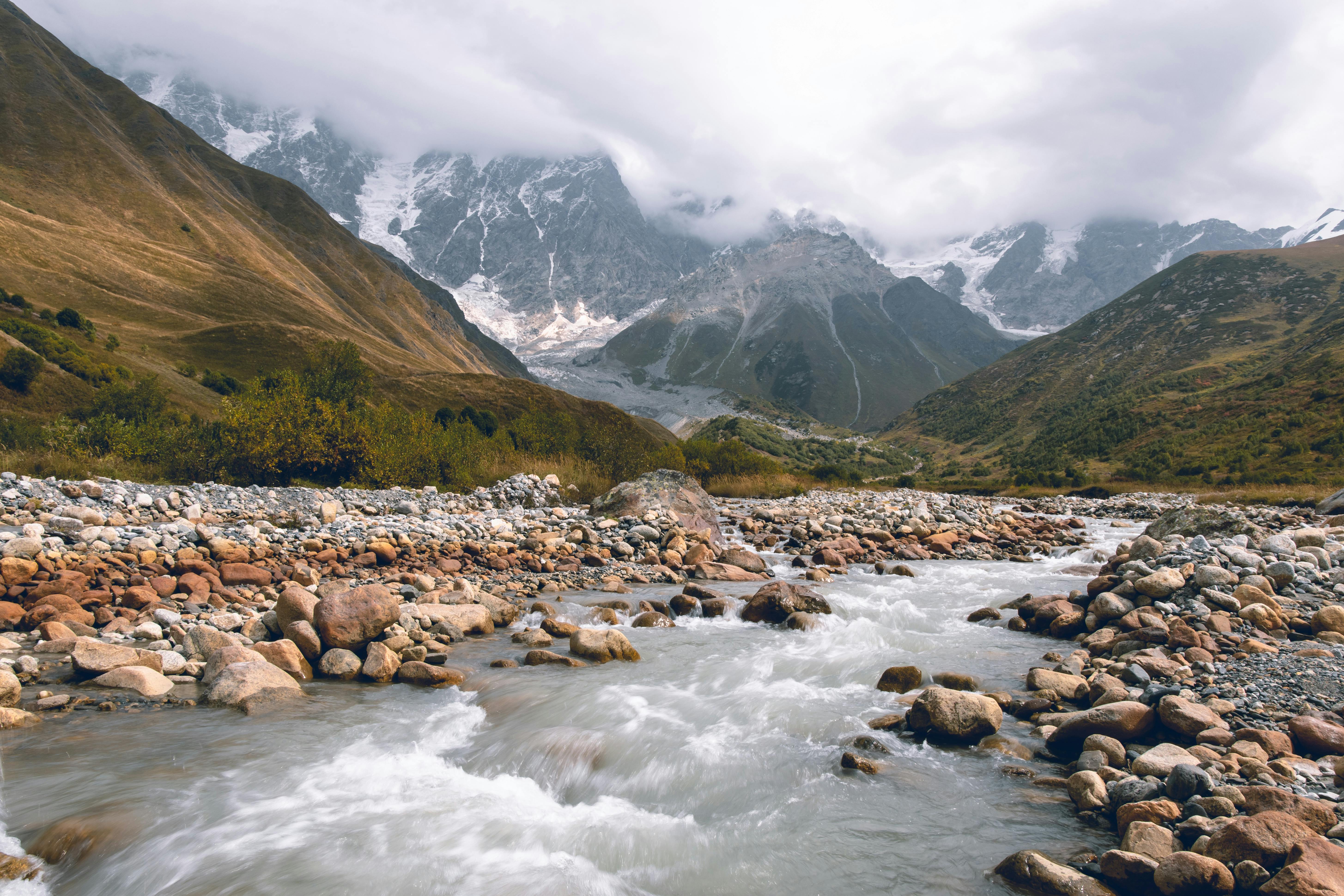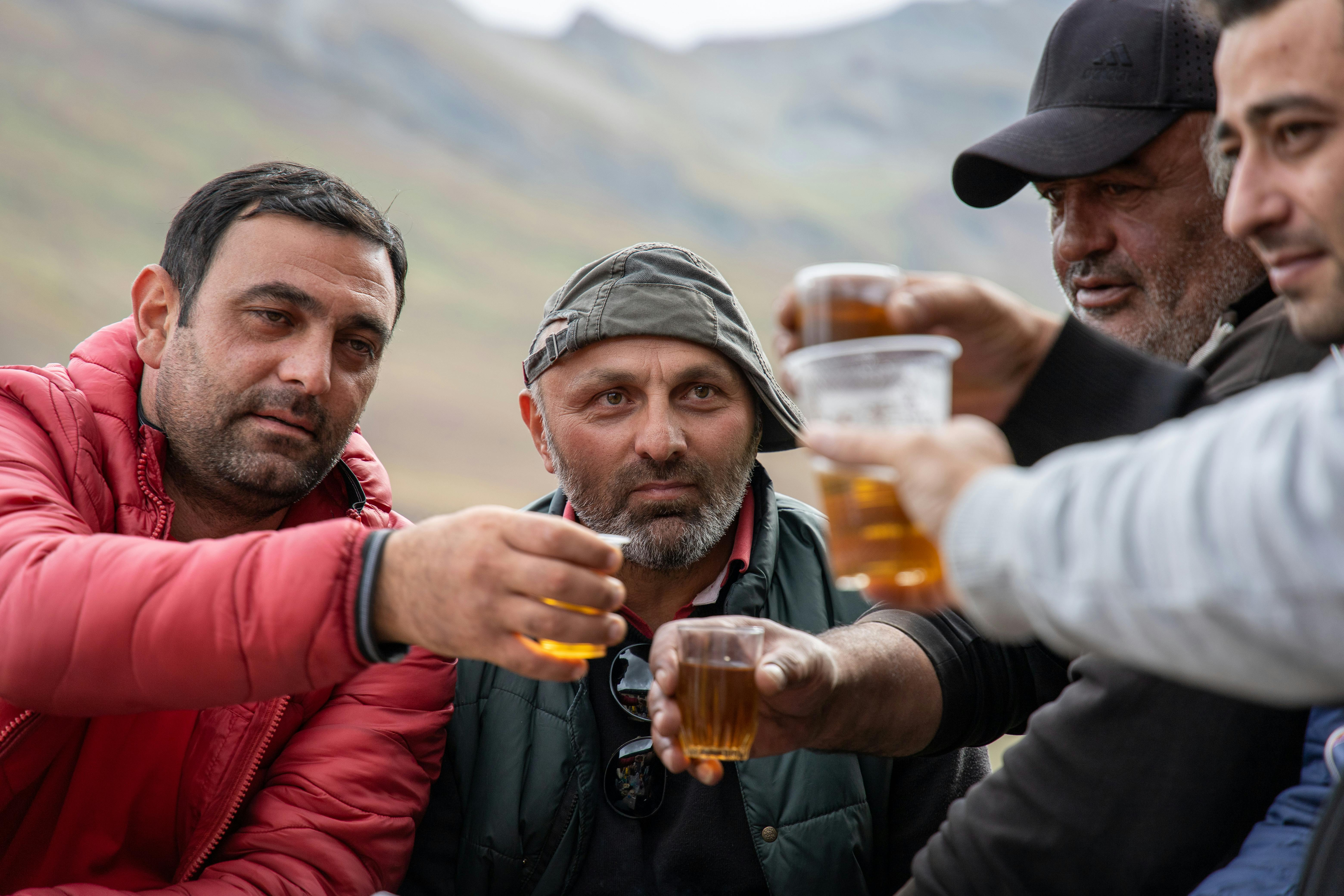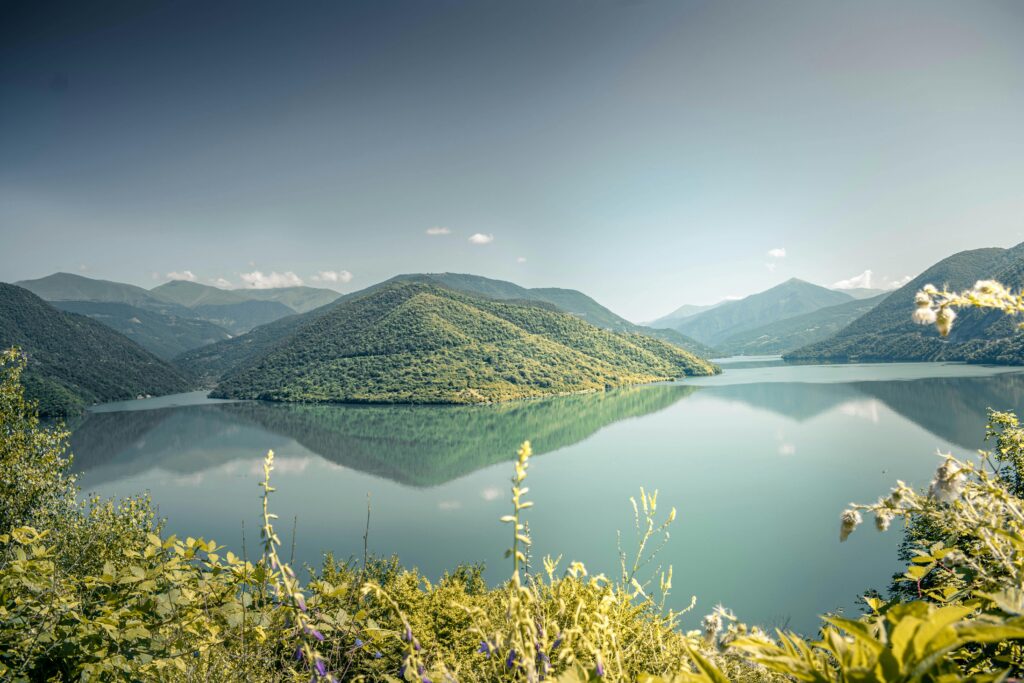Nestled at the foot of the Greater Caucasus Mountains, Georgia is a country that will enchant your senses, force a revision in your assumptions, and leave you wanting for it. This small, former Soviet republic is a haven of ancient history, striking landscapes, and warm hospitality just begging to be explored by intrepid travelers.
To the broke backpacker, Georgia is Heaven on earth. Boasting scarily affordable accommodation, amazing food, and very affordable wine, one could hardly think of a better place to go on an unforgettable adventure without blowing the bank. From the cobblestone streets of Tbilisi’s Old Town to the snow-capped peaks of the Svaneti Range, Georgia’s diverse landscapes and cultures will keep you enthralled.
But Georgia is more than just a pretty face: the complex history, shaped by European, Asian, and Middle Eastern traditions, has forged a really peculiar alloy of cultures that even a seasoned traveler will find fascinating. From ancient monasteries to Soviet-era relics, every corner of Georgia tells stories of resilience, hospitality, and warmth.
In this blog, we are going to go into detail on how one can manage to go broke backpacking Georgia, sharing with you insider tips on how to navigate the country’s affordable accommodation, transportation, and attractions. We are going to explore the best-kept secrets, hidden gems, and off-the-beaten-path destinations for making your Georgian adventure absolutely unforgettable.
So, pack a knapsack and join me on this fantastic journey of discovery through the Caucasus’ best-kept secret. Prepare to revel in Georgia’s breathtaking scenery, fascinating culture, and the catchiest hospitality. It’s your adventure; let’s begin here:.

How to get there:
From Turkey
- Istanbul to Tbilisi: Take the overnight bus from Istanbul’s Otogar (Bus Station) to Tbilisi’s Didube Bus Station (approx. 24 hours, 50-70 TRY / $8-12 USD)
- Trabzon to Batumi: Catch the bus from Trabzon’s Otogar to Batumi’s Central Bus Station (approx. 6 hours, 20-30 TRY / $3-5 USD)
- Border Crossing: The most popular border crossing is at Türkgözü/Sarpi, open 24/7.
From Azerbaijan
- Baku to Tbilisi: Take the overnight bus from Baku’s International Bus Station to Tbilisi’s Didube Bus Station (approx. 14 hours, 20-30 AZN / $12-18 USD)
- Ganja to Tbilisi: Catch the bus from Ganja’s Bus Station to Tbilisi’s Didube Bus Station (approx. 8 hours, 10-20 AZN / $6-12 USD)
- Border Crossing: The main border crossing is at Red Bridge (Qırmızı Körpü), open 24/7.
From Armenia
- Yerevan to Tbilisi: Take the bus from Yerevan’s Kilikia Bus Station to Tbilisi’s Didube Bus Station (approx. 6 hours, 5,000-10,000 AMD / $10-20 USD)
- Gyumri to Tbilisi: Catch the bus from Gyumri’s Bus Station to Tbilisi’s Didube Bus Station (approx. 4 hours, 3,000-6,000 AMD / $6-12 USD)
- Border Crossing: The main border crossing is at Sadakhlo/Bagratashen, open 24/7.
From Russia
Border Crossing: The main border crossing is at Verkhny Lars/Kazbegi, open 24/7.
Moscow to Tbilisi: Take the train from Moscow’s Kazansky Station to Tbilisi’s Central Railway Station (approx. 52 hours, 5,000-10,000 RUB / $75-150 USD)
Sochi to Batumi: Catch the bus from Sochi’s Bus Station to Batumi’s Central Bus Station (approx. 10 hours, 1,000-2,000 RUB / $15-30 USD)
When to go:
Spring (March to May)
- Weather: Mild temperatures (15-20°C/59-68°F), blooming flowers, and greenery.
- Events:
- Nowruz (Persian New Year) celebrations in March.
- Tbilisi International Festival of Theatre.
- Activities:
- Hike in the Caucasus Mountains.
- Explore ancient cities like Mtskheta and Uplistsikhe.
- Visit vineyards for wine tastings.
Summer (June to August)
- Weather: Warm temperatures (25-30°C/77-86°F), sunny days.
- Events:
- Tbilisi Open Air Festival.
- Batumi Black Sea Music Festival.
- Kazbegi Mountain Festival.
- Activities:
- Hike to Gergeti Trinity Church.
- Relax on Batumi’s beaches.
- Explore Svaneti’s ancient villages.
Autumn (September to November)
- Weather: Comfortable temperatures (15-20°C/59-68°F), golden foliage.
- Events:
- Tbilisi International Film Festival.
- Wine harvest festivals.
- Activities:
- Hike in the Caucasus Mountains.
- Visit ancient monasteries.
- Explore Tbilisi’s vibrant art scene.
Winter (December to February)
- Weather: Cold temperatures (-2 to 5°C/28-41°F), snow-covered landscapes.
- Events:
- New Year’s celebrations.
- Tbilisi Winter Festival.
- Activities:
- Skiing and snowboarding in Gudauri.
- Explore Tbilisi’s museums and galleries.
- Relax in thermal springs.
Shoulder Season (April-May and September-October)
- Weather: Mild temperatures, fewer tourists.
- Events:
- Cultural festivals.
- Outdoor activities.
- Activities:
- Hike in the Caucasus Mountains.
- Explore ancient cities.
- Visit vineyards.
Adventure seekers: Winter sports.
Nature lovers: Spring and autumn.
Culture enthusiasts: Summer festivals.
Best Itineraries:
3-Day Itinerary: Tbilisi Explorer
Day 1:
- Explore Tbilisi’s Old Town
- Visit Narikala Fortress
- Wander through the Sulphur Baths
Day 2:
- Visit the National Museum of Georgia
- Walk to the Tbilisi Sea
- Enjoy traditional Georgian cuisine in the evening
Day 3:
- Take a day trip to Mtskheta (UNESCO World Heritage Site)
- Visit the Svetitskhoveli Cathedral
- Return to Tbilisi for a farewell dinner
1-Week Itinerary: Georgia’s Highlights
Day 1-2: Tbilisi
- Explore Old Town
- Visit Narikala Fortress
- Wander through the Sulphur Baths
Day 3-4: Kutaisi
- Visit the Bagrati Cathedral
- Explore the Kutaisi Caves
- Wander through the historic city center
Day 5-6: Batumi
- Relax on Batumi’s beaches
- Visit the Batumi Seaside Boulevard
- Explore the historic city center
Day 7: Return to Tbilisi
2-Week Itinerary: Georgia’s Cultural Heritage
Day 1-3: Tbilisi
- Explore Old Town
- Visit Narikala Fortress
- Wander through the Sulphur Baths
- Visit the National Museum of Georgia
Day 4-5: Mtskheta and Gori
- Visit the Svetitskhoveli Cathedral
- Explore the Stalin Museum
- Visit the ancient city of Uplistsikhe
Day 6-7: Kutaisi
- Visit the Bagrati Cathedral
- Explore the Kutaisi Caves
- Wander through the historic city center
Day 8-9: Batumi
- Relax on Batumi’s beaches
- Visit the Batumi Seaside Boulevard
- Explore the historic city center
Day 10-14: Svaneti Region
- Hike in the Caucasus Mountains
- Explore ancient villages
- Visit traditional Svaneti towers
1-Month Itinerary: Georgia’s Hidden Gems
Week 1: Tbilisi and surrounding areas
- Explore Old Town
- Visit Narikala Fortress
- Wander through the Sulphur Baths
- Visit the National Museum of Georgia
- Take day trips to Mtskheta, Gori, and Uplistsikhe
Week 2: Kutaisi and Batumi
- Visit the Bagrati Cathedral
- Explore the Kutaisi Caves
- Wander through the historic city center
- Relax on Batumi’s beaches
- Visit the Batumi Seaside Boulevard
Week 3: Svaneti Region
- Hike in the Caucasus Mountains
- Explore ancient villages
- Visit traditional Svaneti towers
- Stay with local families
Week 4: Kazbegi and the Caucasus Mountains
Stay in guesthouses and homestays
Hike to Gergeti Trinity Church
Explore the Kazbegi National Park
Visit the Jvari Pass
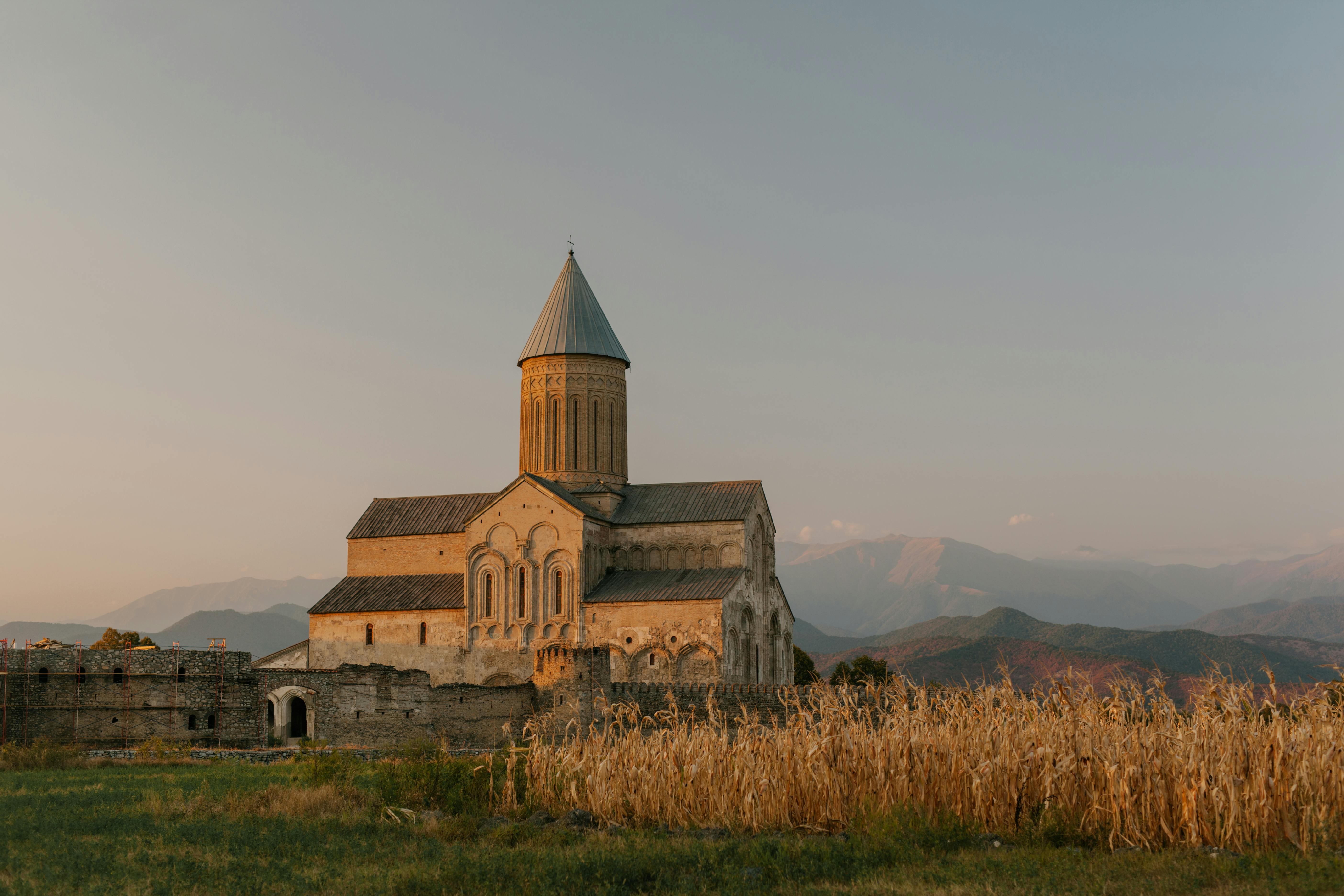
Transportation:
Georgia, boasts an extensive public transportation network that connects its cities, towns, and villages. As a traveler, understanding the public transportation system can help you navigate the country efficiently and affordably.
Types of Public Transportation in Georgia
- Marshrutkas (Minivans): The most popular mode of public transportation, marshrutkas operate on fixed routes and schedules.
- Buses: City buses and intercity buses connect major towns and cities.
- Trains: Georgia’s rail network links major cities, including Tbilisi, Batumi, and Kutaisi.
- Taxis: Private taxis and taxi services are widely available.
- Metro: Tbilisi has a two-line metro system.
Marshrutkas (Minivans)
- Routes: Fixed routes, connecting cities, towns, and villages.
- Schedules: Generally operate from 7 am to 7 pm.
- Frequency: Every 15-30 minutes.
- Fares: 1-5 GEL (~ $0.40-$2 USD) per ride.
- Payment: Cash only.
Buses
- Routes: City buses and intercity buses connect major towns and cities.
- Schedules: Varying schedules, generally operating from 7 am to 7 pm.
- Frequency: Every 30-60 minutes.
- Fares: 1-10 GEL (~ $0.40-$4 USD) per ride.
- Payment: Cash only.
Trains
- Routes: Connect major cities, including Tbilisi, Batumi, and Kutaisi.
- Schedules: Varying schedules, generally operating daily.
- Frequency: Multiple departures per day.
- Fares: 10-50 GEL (~ $4-$20 USD) per ride.
- Payment: Cash or credit card.
Taxis
- Services: Private taxis and taxi services.
- Fares: Negotiable, approximately 10-50 GEL (~ $4-$20 USD) per ride.
- Payment: Cash only.
Metro (Tbilisi)
- Lines: Two lines, connecting major city centers.
- Schedules: Operating from 6 am to 11 pm.
- Frequency: Every 2-5 minutes.
- Fares: 1 GEL (~ $0.40 USD) per ride.
- Payment: Cash or metro card.
Useful Apps and Resources
Georgian Railway: Official website for train schedules and bookings.
Google Maps: Provides route information and schedules.
Tbilisi Transport: Official app for Tbilisi’s public transportation.
Marshrutka.ge: Route information and schedules for marshrutkas.
Top things to do:
Tbilisi:
- Explore Old Town’s narrow streets and architecture.
- Visit Narikala Fortress for panoramic views.
- Wander through the Sulphur Baths.
- Discover the National Museum of Georgia.
- Walk along the Kura River.
- Visit the Tbilisi Flea Market.
- Enjoy traditional Georgian cuisine in the city’s many restaurants.
- Visit the Tbilisi State Opera and Ballet Theatre.
- Explore the Mtatsminda Park.
- Visit the Georgian National Gallery.
Kutaisi:
- Explore the ancient city of Kutaisi.
- Visit the Bagrati Cathedral.
- Wander through the Kutaisi Caves.
- Discover the Kutaisi Historical Museum.
- Relax in the Kutaisi Central Park.
- Visit the Gelati Monastery (UNESCO World Heritage Site).
- Explore the Sataplia Nature Reserve.
Batumi:
- Relax on Batumi’s beaches.
- Stroll along the Batumi Seaside Boulevard.
- Visit the Batumi Lighthouse.
- Explore the Batumi Botanical Garden.
- Enjoy the city’s vibrant nightlife.
- Visit the Batumi Archaeological Museum.
- Take a boat tour of the Black Sea.
Svaneti Region:
- Hike in the Caucasus Mountains.
- Explore ancient Svaneti villages.
- Visit traditional Svaneti towers.
- Experience local Svaneti culture.
- Trek to the Koruldi Lakes.
- Visit the Mestia Museum of History and Ethnography.
- Explore the Ushguli Village.
Kazbegi:
- Hike to Gergeti Trinity Church.
- Explore the Kazbegi National Park.
- Visit the Jvari Pass.
- Enjoy stunning mountain views.
- Stay in local guesthouses.
- Visit the Dariali Gorge.
- Explore the Kazbegi Village.
Gori:
- Visit the Stalin Museum.
- Explore the ancient city of Uplistsikhe.
- Wander through the Gori Historical Museum.
- Visit the Gori Fortress.
- Discover local wine production.
- Visit the Gori Cathedral.
- Explore the Gori City Park.
Mtskheta:
- Visit the Svetitskhoveli Cathedral (UNESCO World Heritage Site).
- Explore the ancient city of Mtskheta.
- Wander through the Mtskheta Historical Museum.
- Visit the Jvari Monastery.
- Enjoy stunning views of the Kura River.
- Visit the Mtskheta Bazaar.
- Explore the Armazi Fortress.
Telavi:
- Explore the ancient city and wine region.
- Visit the Telavi Fortress.
- Wander through the Telavi Historical Museum.
- Visit the Alaverdi Monastery.
- Enjoy wine tastings.
- Visit the Tsinandali Palace.
- Explore the Telavi Central Park.
Signagi:
- Visit the Signagi Fortress.
- Enjoy wine tastings.
- Explore the Signagi Village.
- Visit the Bodbe Monastery.
- Enjoy stunning views of the Alazani Valley.
- Visit the Signagi Museum of History and Ethnography.
- Explore the nearby villages.
Borjomi:
- Visit the Borjomi-Kharagauli National Park.
- Explore the Borjomi Cave.
- Wander through the Borjomi Central Park.
- Visit the Borjomi Palace.
- Enjoy the local mineral water.
- Visit the Borjomi Museum of History and Ethnography.
- Explore the nearby villages.
Vardzia:
- Explore the ancient cave city.
- Visit the Vardzia Monastery.
- Wander through the Vardzia Historical Museum.
- Enjoy stunning views of the surrounding mountains.
- Visit the nearby Khertvisi Fortress.
- Explore the Vardzia Village.
- Take a hike through the surrounding countryside.
Other destinations:
Lagodekhi National Park: Hike and explore the park.
Ananuri: Visit the Ananuri Fortress.
Uplistsikhe: Explore the ancient cave city.
David Gareja: Visit the David Gareja Monastery.
Tusheti National Park: Hike and explore the park.
Food:
Pictorially situated at the crossroads between Europe and Asia, Georgia is a food lover’s heaven. Because of its strategic location, the country has developed a unique culinary landscape, blending traditional Georgian dishes with influences from neighboring countries. This finally led to a curious cuisine that was both familiar and exotic.
The flavors, aromas, and spices in Georgian cuisine have always been bold. Starters are aplenty, with meals leading off with a vegetable dish of walnuts and spices called pkhali, a salty, tangy cheese called sulguni, and lobio, a bean salad full of depth. The main courses, on the other hand, are meat dishes full of flavor: khinkali, which is a dumpling filled with spiced meat and herbs; mtsvadi, consisting of skewers of marinated meat; and chanakhi, a lamb stew so juicy. These are usually served with a shotis puri: some sort of crusty, cheesy bread that is baked in a stone oven. Within the art of making bread, Georgian people have managed to embed it into the blood and flesh of the culture. Shotis puri is present in every household, very tasty, and accompanies nearly every meal with a selection of cheeses like sulguni and gebzalia. Confectionary amateurs will definitely overindulge in a variety of sweet and savory pastries, among them khachapuri-boat-shaped cheese bread-and churchkhela-dried fruit and nut pastry in candy-like fashion.
A glass of wine is traditionally presented as a token of hospitality and friendship. Historically, Georgia has been truly famous for its age-old tradition of winemaking, with the latter dating back to over 8,000 years. White wines, red wines, and sparkling wines form a whole gamut of wines produced in the country. The most well-known wine-producing areas constitute Kakheti, Imereti, and Racha, each producing different wines due to their unique climate and soil. For those who want something stronger, the popular drinks include chacha, a fruit brandy, and cognac.
In fact, every region of Georgia has its own culinary specialty, with characteristic features of ingredients and traditions. In the mountainous regions, you can expect substantial stews with meat and roasted game meats such as deer and wild boar. On the Black Sea coast, seafood is fresh, as is sulguni cheese, often served with a side dish of khachapuri. The capital city, Tbilisi, serves very traditional Georgian food, but also newer twists and other international flavors, due to its cosmopolitan nature.
As a rule, dinner in Georgia is a social process: it is filled with national songs, dances, and toasts. Specially for guests, a supra is organised-heads of feasts, usually led by the tamada, or toastmaster. The tamada leads the dinner conversation along, proposing toasts and making sure that everybody’s glass of wine is full. All this contributes to a lively and convivial atmosphere during dinner in Georgia.
And from freshly baked bread to roasted chestnuts and corn on the cob, street food in Georgia is a real treat. Taste some typical Georgian snacks, like khachapuri or lobiani-a kind of bean-filled bread that is baked in a stone oven. These snacks will be good for having on the run or at a local market.
Food is very important to Georgians; mealtime, in particular, is an opportunity to reunite with family and friends. Traditional Georgian food is steeped in the history of this country. It really reflects the rich cultural diversity of this country. Very often, mealtimes are considered to be the times when most stories are shared, toasts are made, and relationships are nurtured.
Throughout the year, a number of gastronomic festivals and events are held in Georgia, showcasing its incredibly rich gastronomic traditions. Examples include the Tbilisi Food Festival, Batumi Culinary Festival, and Georgian Wine Festival. Local chefs, food manufacturers, and winemakers come together in events like these to give voice to the cuisine of Georgia.
In sum, Georgia’s gastronomic landscape is indeed representative of warm hospitality and rich cultural heritage. With its bold flavors, aromatic spices, and hearty dishes, the national cuisine of Georgia certainly will please even the most fastidious gourmet. From a foodie to a wine amateur or one eager to experience the local culture, Georgia’s culinary scene has something for everyone.
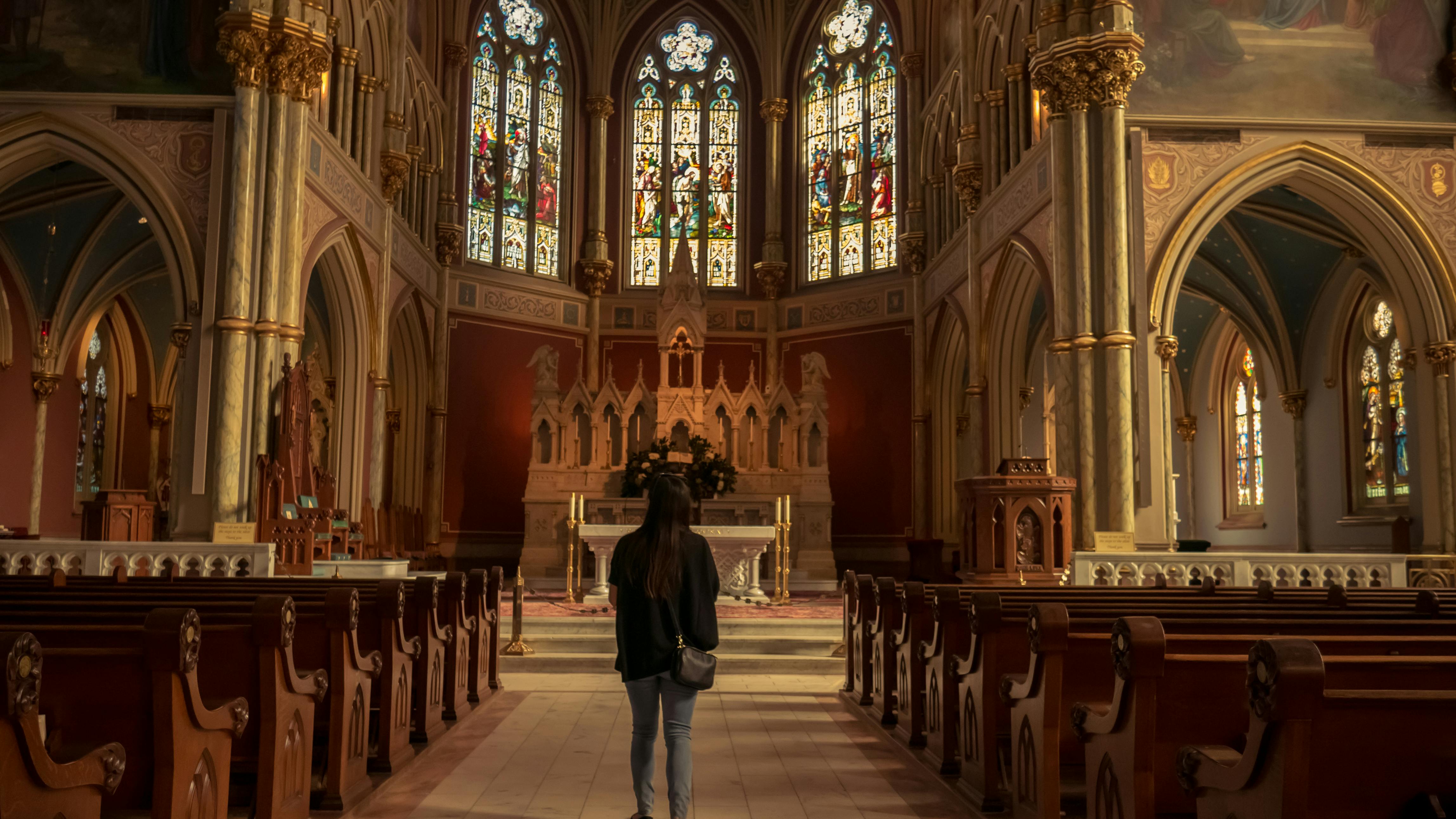
Culture:
Georgia is a country of truly different cultural experience and the hearts of many travelers and lovers of culture. Its millennia-long history has created a very interesting combination of traditional and contemporary features in Georgia’s cultural landscape.
At the heart of Georgian culture lies a rich history formed by its strategic location at the crossroads between Europe and Asia. Throughout the centuries, Georgia has been intermingled into empires of ancient Greeks, Romans, and Mongols, each leaving their influence on its language, architecture, and art. This cultural melting pot made an absolutely exclusive identity-that is quite Georgian.
One of the salient features of Georgian culture is its hospitality. Many visitors usually get welcomed with broad smiles and open arms because Georgians take great pride in welcoming their guests into their homes. As a matter of fact, this tradition of hospitality dates back into the country’s history, whereby guests were considered a blessing from God. Today, the warm welcome is still evident through many supra, or feasts, that take place throughout the country.
Supra is deep-rooted in the culture of Georgia, where it joins family and friends together to share in the food, wine, and tales of their community. Jolly gatherings are led by a tamada, or toastmaster, who keeps the conversation going and toasts-so that no glass of wine ever stays empty. Supra is way more than just lunch or dinner; rather, it’s a method of establishing camaraderie, respect, and deep senses of community among people.
Most impressively, the cultural heritage of Georgia is embodied in its architectural beauties: from the ancient city of Mtskheta to the modern capital of Tbilisi, the country is speckled with breathtaking buildings that illustrate in detail its rich history. One of the most characteristic examples of Georgian architecture is the Svetitskhoveli Cathedral-a UNESCO World Heritage Site-famous for stunning stone carvings and intricate frescoes.
Music and dance are also a significant constituent of Georgian culture. Traditional folk songs which are polyphonic in nature are typical of Georgian music, full of complex harmonies and melodies that give one a picturesque view of the rugged landscape of the country. The Georgian dance is a sight to watch, full of grace in terms of movement and color because of the multi-colored clothes worn while dancing.
Another characteristic of this country is the Georgian language, which possesses its own distinctive alphabet and grammatical features. It is considered one of the oldest languages in the world, since about 4 million people in the world speak Georgian.
Appreciation for art and literature has long been part of Georgian culture. Among the most renowned writers in the world, such as Shota Rustaveli, whose “The Knight in the Panther’s Skin” is an epic poem recognized as a masterpiece of Georgian literature. The Georgian art, from ancient frescoes to modern paintings, stands as a reflection of the country’s rich cultural heritage.
The strong Orthodox Christian tradition of Georgia is an equal contributor to its cultural identity. Christianity was adopted by the country in the 4th century, and today, the Georgian Orthodox Church is playing an important part in shaping the values and customs of the country.
Despite the enrichment by its cultural heritage, Georgia is not staying in the past-it rapidly modernizes: contemporary art, music, and literature develop shoulder to shoulder with traditional ones. This is a very specific cultural dynamics, admittedly Georgian.
Equally alive is the cultural scene in the country, with scores of festivals and events running throughout the year. Among many such events, the Tbilisi International Festival, Batumi Black Sea Music Festival, and the Georgian Film Festival have been the representatives among the multiple events highlighting the rich heritage of Georgia.
Most of all, it is the outstanding natural beauty of Georgia that constitutes a big part of its cultural identity. The countryside-with severe mountain peaks, rolling hills, and deep, picturesque valleys-has long inspired artists, writers, and musicians alike. The great Caucasus Mountains, stretching right across the northern part of the country, have given the country some pride and inspiration.
Besides its cultural heritage, Georgia is also renowned for its cuisine, which is a combination of its geographical location and cultural influences. Such traditional Georgian food as khinkali, khachapuri, and mtsvadi-skewers is very flavorful and substantial; besides, it is normally accompanied by a glass of fine Georgian wine.
Wine traditions of Georgia trace back several thousand years, and archaeological evidence of wine production has been found at numerous places. Today, Georgian wine has great respect for quality and identity of flavor profile. Qvevri, Saperavi, and Rkatsiteli are popular types of Georgian wines.
More precisely, Georgian culture is a poignant tapestry interwoven from threads of history and tradition with great facets of creativity. From its hospitable warmth to stunning architectural, musical, and artistic insights, there is an absolute treasure in the cultural heritage of Georgia. Whether cultural enthusiasts, history buffs, or those who seek simply to experience the real spirit of the Caucasus, it surely would be captivating and inspiring to see the culture of Georgia.
Accommodations:
Traveling through Georgia can be totally intimidating for broke backpackers, especially when finding cheap accommodations. Whoever dares to go into the unknown finds the cheapest hostels offering some of the most wild, crazy, and amazing experiences.
The hostel scene in Georgia is anything but sterile, cookie-cutter establishments found elsewhere in Western Europe. Many of these budget hostels are family-run affairs where the lines between guest and host are blurred, and the concept of “service” takes on a completely different meaning. These are not just hostels in which one lays their head; rather, they are immersive experiences that create lifelong memories.
Booking the cheapest option available is often a gamble, but it is frequently the best way to get a genuine view of Georgia. You may well find yourself sharing a dormitory with locals who will regale you with stories of the country’s complex history and invite you to join them for a supra (feast). Or maybe you stumble upon an old Soviet-era building with crumbling walls and find a hostel inside whose charm only the eccentricities of the owner can match.
In budget-range hostels, Georgia takes on full meaning of the phrase “rough around the edges”. Think shared bathrooms with precarious plumbing, creaky beds, and decor that defies explanation. But it’s exactly this lack of polish that makes them so appealing. The rough edges remind one that this is something real, something unsterilized for the masses.
The owners are usually very interesting characters, who just love to host and make you a part of their family. They will force-feed you with home-made wine, force-feed you with khachapuri, and insist on teaching you traditional Georgian dances. It is not uncommon that guests turn out to be some sort of honorary members of the family: join in impromptu feasts and celebrations. Actually, these hosts share their culture, traditions, and life with guests, rather than just offering them a roof over their heads.
You can feel it, the social atmosphere in these hostels. People come from around the world and share stories of ups and downs. The absence of comforts now turns out to be a blessing in disguise because without them, guests are compelled to interact with each other and the locals. You will be sharing about trekking in the Caucasus Mountains or finding secret neighborhoods in Tbilisi with the other travelers.
So, budget hostels in Georgia are also a crash course in cultural immersion: learn how to work your way around the complexities of Georgian etiquette, where toasting is an art form and respect for elders paramount. You’ll learn about the hidden gems of underground music venues and secret sulphur baths. Be introduced to bold- flavoured and spiced traditional Georgian cuisine, maybe learn how to cook a few dishes yourself.
Admittedly, there are risks: the cheapest hostels sometimes don’t meet Western standards of cleanliness or safety. But for those who do take the plunge, the possible risks are greatly overshadowed by the rewards. An appreciation of life’s basic amenities, such as a warm bed and a hot shower, will be acquired. One will learn to adapt when situations get unpredictable and find humor in the absurd.
This is where, in most budget hostels of Georgia, the borders of a host and guest get blurred, and that’s where the real spirit of hospitality beams across. It lingers as an experience in one’s memory forever, gives one more respect for Georgian culture, and installs a healthy skepticism towards the sanitized uniformity of hostels elsewhere.
And while going through narrow streets, either in Tbilisi or some other rural village of Georgia, remember that low-budget hostels are very often the most genuine ones. Never be afraid to try something completely new-it can be an experience of your lifetime.
The hostels in the budget category in Georgia are little more than a place to rest, serving as an entrance into a world that’s full of unforgettable experiences. They are examples of the power of hospitality and the generosity of the Georgian people. Come with an open mind, ready for adjustment, and a healthy dose of curiosity. For one never knows what hidden gems or eccentric characters, unforgettable experiences await.
Nightlife:
When the sun goes down, casting a magical spell over Georgia’s towering mountains and bustling cities, nightlife turns up the volume with its incomparable traditional-modern performances. From underground clubs to rooftop bars, from folk to electronic-Georgia’s nights can offer something for any taste and style.
Nightlife in Georgia simply means going out, but it is deeply ingrained into the country’s culture and its social life. Georgians love to get together, tell stories, and enjoy each other’s company often deep into the night. This friendliness is contagious since it presents visitors with a sense of welcome and shared revelry.
Tbilisi, being the capital, is the center of nightlife concentration in Georgia. Narrow lanes and alleys host a row of bars, clubs, and lounges, each having its own identity. From trendy cocktail bars to dingy dive bars, the nightlife of Tbilisi is incomparably variant. You may find yourself having chanced upon some hidden speakeasy, with expertly mixed craft cocktails, or at a crowded dance club with pulsating electronic beats.
Yet, beyond the urban cores, Georgia has much more in store. Smaller towns and villages take pride in traditional nightlife: cozy taverns, family-run restaurants where locals share stories, sing folk songs, and generally enjoy the traditional fare. Events often come together in a spontaneous or informal way, with musicians and dancers joining in on the impromptu fun.
Probably the most distinctive feature of nightlife in Georgia is the love of traditional music and dance. Restaurants, bars, and cultural centers commonly host folk ensembles and dance troupes that represent the rich cultural traditions of the country. The polyphonic singing that typifies Georgian folk music is hauntingly beautiful, while the traditional dances-unnecessarily complicated steps and colorful costumes-are mesmerizing.
At night, nightlife really takes off in Georgia. Bars and clubs open deep into the morning hours, and the streets at any time are filled with people strolling along, laughing, and taking in the cool night air. In summer, rooftop bars and outdoor venues burst into color, offering breathtaking views of the city and surrounding mountains.
Despite its increasing popularity, nightlife in Georgia is somewhat underground, with many discoveries to be had. Often, visitors find themselves suddenly thrust into a secret jazz club, or some sort of live music in a basement, or a street performance somewhere.
Nightlife in Georgia is also extremely well-priced and, therefore, accessible to travelers of any budget. You can have a night out for as low as a few dollars, with drinks, food, and entertainment at remarkably reasonable prices.
Finally, the nightlife in Georgia can never be compared with anything in life. Combining great traditions and modern features, outstanding natural beauty, and very hospitable people, a night spent here will make you dance, sing, and enjoy up to the morning hours. Be it a party animal, culture vulture, or one aiming just for an experience, Georgia’s nightlife has something for everyone.
So come and dive into the very heart of the vibrant nightlife of Georgia: polyphonic singing, delicious Georgian cuisine, warm hospitality, all seducing you. You know not what may await you in this country, full of unforgettable experiences.
Backpacking Georgia costs:
Daily Expenses:
Accommodation:
- Hostel dorm: $8-12 (24-36 GEL)
- Budget guesthouse: $15-20 (45-60 GEL)
Food:
- Mid-range restaurant meal: $5-8 (15-24 GEL)
- Street food/supermarket snacks: $3-5 (10-15 GEL)
- Groceries for self-catering: $10-15 (30-45 GEL)
Transportation:
- Public transportation: $0.50-1.50 (1.50-4.50 GEL)
- Marshrutka (minibus): $2-5 (6-15 GEL)
- Taxi: $10-15 (30-45 GEL)
Activities:
- Museum entrance: $5-10 (15-30 GEL)
- Historical sites: $10-15 (30-45 GEL)
- Hiking/trail fees: $5-10 (15-30 GEL)
Other:
- Water: $1-2 (3-6 GEL)
- Snacks: $2-5 (6-15 GEL)
- Miscellaneous: $5-10 (15-30 GEL)
Total daily expenses: $10-20 (30-60 GEL)
Weekly Expenses:
Accommodation:
- Hostel dorm: $56-84 (168-252 GEL)
- Budget guesthouse: $105-140 (315-420 GEL)
Food:
- Mid-range restaurant meals: $35-56 (105-168 GEL)
- Street food/supermarket snacks: $21-35 (63-105 GEL)
- Groceries for self-catering: $70-105 (210-315 GEL)
Transportation:
- Public transportation: $3.50-10.50 (10.50-31.50 GEL)
- Marshrutka (minibus): $14-35 (42-105 GEL)
- Taxi: $70-105 (210-315 GEL)
Activities:
- Museum entrance: $35-70 (105-210 GEL)
- Historical sites: $70-105 (210-315 GEL)
- Hiking/trail fees: $35-70 (105-210 GEL)
Other:
- Water: $7-14 (21-42 GEL)
- Snacks: $14-35 (42-105 GEL)
- Miscellaneous: $35-70 (105-210 GEL)
Total weekly expenses: $70-140 (210-420 GEL)
Conclusion:
As I reflect on my journey through Georgia, I’m reminded that traveling on a Broke budget isn’t just about pinching pennies – it’s about embracing the raw, unfiltered experience of a foreign land. That would make Georgia, with all its varied beauty, literate and hospitable people, literally the exact destination a broke backpacker like me needed.
Georgia has always been such a beautiful place, from its winding streets of Tbilisi up to the majestic mountains of Kazbegi; it is quite an awe-inspiring land. Yet, it is not just the scenery, it is the people, their culture, and that feel of community, as every single bit of Georgian life seems full of it.
As a poor backpacker, low prices of Georgia helped me engage with local life and taste new dishes, drinks, and activities without going bankrupt. Shared meals with strangers, hitchhikes with locals, and all those little secrets that a more tightly scheduled trip might have bypassed for me.
Georgia taught me that traveling is not just sightseeing; it is about living life. It is in embracing the unknown, giving in to the unpredictable, and finding happiness in the most banal instances.
To all the would-be Georgia visitors who had intended to visit on a very tight budget, I say, do not be discouraged. It is in these rough edges that beauty lies, and the rewards are well worth the challenges. Come with an open mind, a will to adapt, and healthy doses of curiosity.
Georgia is a country that will amaze, cheer, and make you feel like wanting more. Its outstanding landscape, kaleidoscope culture, and warm hospitality will make your senses go whirling, and it is affordable to make sure you get a taste for all of these without having to break the bank.
Travel lightly, pack a sense of adventure, and ready your heart to fall in love with this intriguing country. Georgia now awaits you, with her beauty, hospitality, and charm to remain in your heart forever.
